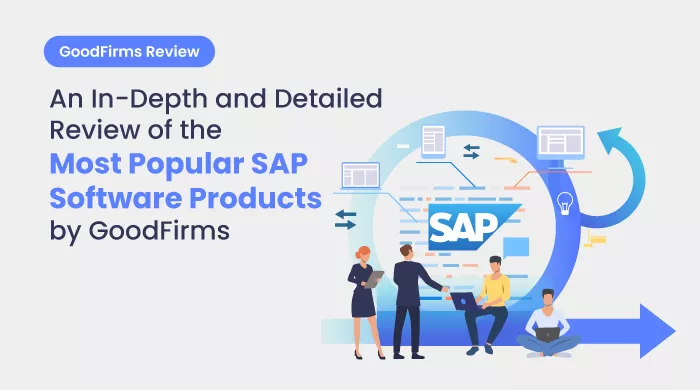The modern business landscape is rapidly transforming owing to the rise in the usage of digital technologies in business functions. This transformation is visible in many sectors and departments. Global spending on digital transformation is estimated to reach $3.4 trillion by 2026. One such function is resource planning, a crucial aspect of any business to ensure proper optimum performance and growth. Resource planning includes most business processes, such as financials, inventory, human resources, production, etc.
Resource planning is the core tower of strength for any business that wants to achieve long-term sustainability and upscale its prospects in this competitive market. It is the art of approximately estimating the time, budget, and workforce required to complete a project successfully. Resource planning allows organizations to reduce project expenditure, optimize skill utilization, save time, meet project demands, plan, improve prediction, etc.
“Plan your work for today and every day, then work your plan.” - Margaret Thatcher, Former Prime Minister of the United Kingdom.
What is Enterprise Resource Planning Software?
Enterprise resource planning or ERP software is typically a modern-day digital tool businesses use to automate core processes and gain real-time visibility into the business's performance, growth, resiliency, and operations. Such a facility enables a good hold of the company in the current situation and sustainably future-proofs your business. The two most important considerations for businesses in selecting the best ERP software system are pricing and functionalities. Therefore, this report will focus on these two parameters of some popular ERP tools for your business operations.
Why ERP Software?
A typical Enterprise Resource Planning (ERP) Systems suite includes integrated applications for core business functions ranging from human resources, manufacturing, accounting, and marketing to inventory and supply chain management. It can collectively perform the functions of Accounting, Business Management, Procurement, Inventory Management, Order Management, Warehouse Management, Supply Chain Management, Customer Relationship Management, Workforce Management, HR, Financial Management, Inventory Management, Project Management, Sales, Customer Service, etc. ERP software can offer numerous advantages to firms. Some of these are as follows:
“Implementing the ERP system and realizing the promised benefits are two different ball games. Implementation can be a success, but if the operational phase is not planned and organized properly with the support of all the people involved, then the promised benefits will not materialize.” - Alexis Leon, Renowned Author/ Software Consultant.
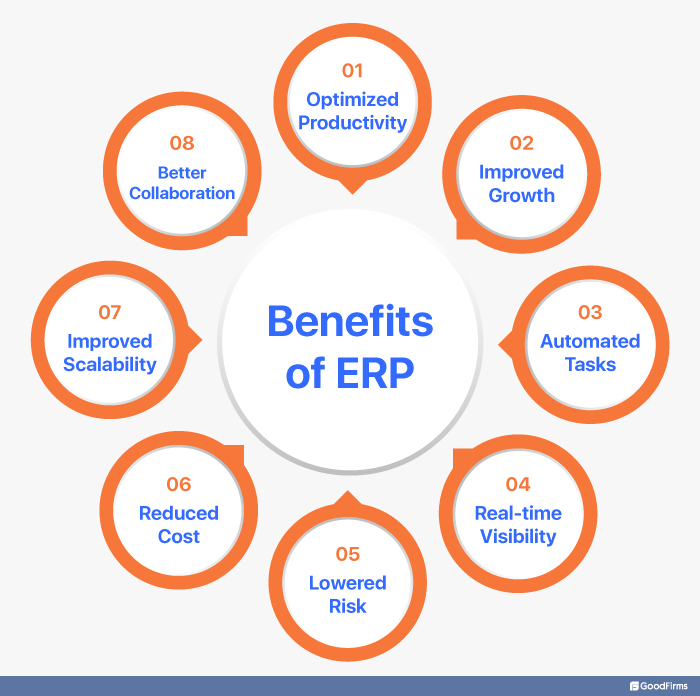
Optimized Productivity
ERP software allows more enhanced collaboration across different teams. While this collaboration may differ based on software vendors, it significantly enables the workforce to be more productive, as stated by 85% of respondents in the latest survey conducted by Microsoft.
Improved Growth
ERP systems with essential functionalities can easily help any organization improve business performance. It offers valuable information to management, automates business tasks, and streamlines processes bringing better transparency and real-time analysis for driving improved business growth. 57% of businesses believe that ERP tools have helped improve their agility.
Automate Tasks
Enterprise Resource Planning (ERP) Systems come with automation technologies, such as artificial intelligence, IoT, robotic process automation, etc., for handling repetitive tasks associated with sales, inventory, order processing, supply chain, etc. This helps in reducing the potential for human error while ensuring increased efficiency.
Real-time Visibility
ERP software provides relevant business insights into different teams and operations through which businesses can easily and effectively assign goals, deadlines, and targets to employees at different levels. Moreover, these insights also assist users in visualizing losses and measuring performance for faster decision making as stated by 67% of companies.
Lower Risk
Sometimes, risks are inevitable, but other times, they can be reduced or prevented through enterprise resource planning software. ERP system offers compliance management, real-time value-driven insights, optimized partner and supplier coordination, etc., to lower risks. ERP tools nullify threats due to human errors by automating data entry tasks.
Reduced Cost
ERP software is known for processing accurate information helping businesses to optimize their operational and administrative costs. An ERP software can reduce manual data entry, streamline production, enhance inventory management, improve data reporting, etc., which helps reduce wastage, ultimately lowering costs.
Scalability
Most ERP systems are scalable, i.e., more users can be added as per requirements. An ERP software can scale and evolve with the business growth, eliminating the need for a new ERP system. Generally, cloud systems are more scalable than on-premise deployment.
Better Collaboration
An ERP system lets Users quickly see other processes and procedures. Due to this, the workers can communicate with each other frequently and rapidly to eliminate duplicate work and brainstorm new ways. This helps in better collaboration which ultimately helps in improving business performance.
Top Features to Consider While Selecting an ERP Software
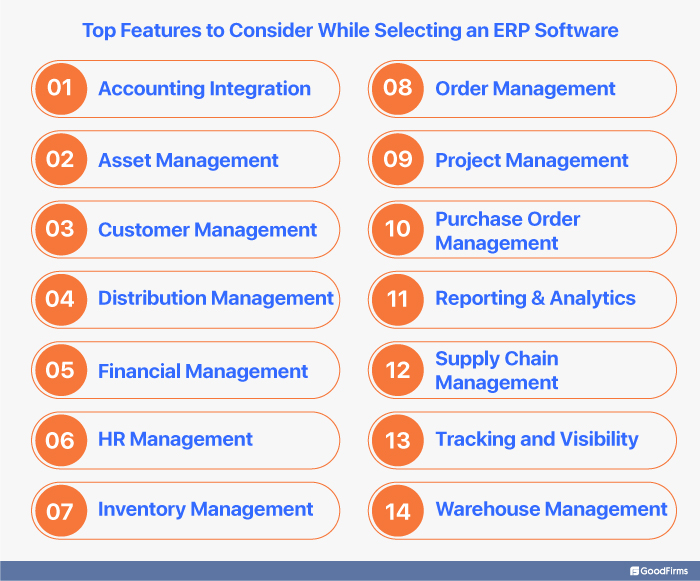
Why Integrations are important for ERP?
One of the critical features of an ERP system is its capacity to integrate with other tools, processes, resources, and traditional technologies. It is one of the core functionalities through which enterprise resource planning tools can function more seamlessly and efficiently. ERP platform acts as a central hub for all business information with the right integrations to optimize daily operations. About 39% of organizations consider integration as a primary factor to select ERP software.
Why is Accounting Integration Important in ERP?
An ERP tool is useful in streamlining financial operations and accounting management to gather a holistic view of the business. It performs different accounting functions, from forecasting, dynamic budgeting, and financial planning to financial reporting and compliance. It allows businesses to carry tax management, multi-currency reconciliation, fixed assets management, revenue recognition, etc. Businesses can significantly reduce costs, time, and burden on the workforce.
Have a look at the accounting dashboard of SAP ERP
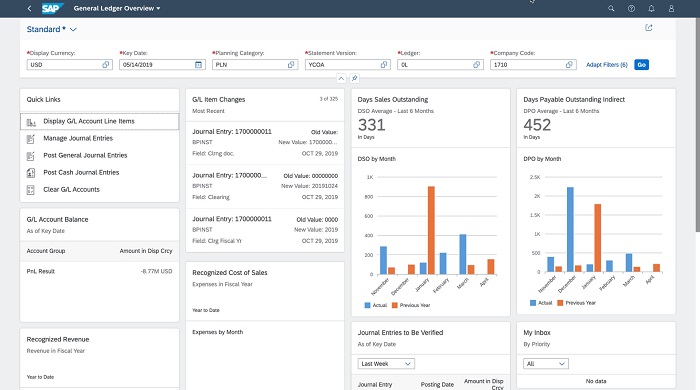
Source: SAP
Why are Reporting and Analytics Important for ERP?
ERP software with accurate reporting and analytics capabilities allows users/businesses to have a clear understanding of their operations. Reporting and analytics provide an in-depth view of business data, formulating better decisions and improving business performance. For example, a renowned consumer goods company automated its 67 types of reports using a modern ERP system. In addition, this reporting and analytics are beneficial in automating data entry for improved productivity and reduced data errors, ultimately enhancing process efficiency.
What deployment works well? Cloud ERP or On-premise ERP?
When it comes to deploying the ERP solution, businesses have to select between on-premise or cloud-based platforms. 64.5% of businesses prefer Cloud ERP systems, while 35.5% of enterprises prioritize on-premises ERP systems. Both models have their own sets of benefits, and businesses select the one that matches their requirements Cloud-based ERP is one of the latest ERP trends that has witnessed significant growth in recent years.
“Businesses know that there are significant benefits from a move to the cloud, but uncertainty holds them back,” says Filip Decostere, a partner in Delaware.
Why Should You Opt for Customizations in ERP?
Customization allows businesses to make necessary changes in the ERP system for aligning it with their business goals. Customizations enable businesses to enhance user adoption, data accuracy, and efficiency and reduce costs.
How Does an ERP System Help in Optimizing Supply Chain and Inventory Management?
A robust ERP system with proper supply chain and inventory management capabilities can assist businesses in inventory optimization, demand forecasting, supplier management, procurement, delivery, etc.
How Does an ERP System Help in Optimizing HRM Functions?
Enterprise resource planning also helps organizations to manage their human resource department efficiently. The software helps the HR department in hiring, onboarding, payroll, recruitment, compensation, etc. It can also assist in automating complex functions such as tax deductions for saving business resources and time. Some ERP solutions come with learning management functionalities for employee training and skill upgradation purposes, improving productivity. A leading distributor reportedly reduced its payroll processing time by 84% after implementing an ERP system.
Have a look at the HRM dashboard of NetSuite

Source: NetSuite
How Effective is it to have Manufacturing Functionalities in ERP?
The manufacturing sector is the top consumer of ERP tools. It allows them to automate their processes and boost agility. It streamlines sales order management, product lifecycle management, quality management, reporting, material requirement planning, etc. For example, the ERP platform helped a US-based PVC-Free manufacturer improve their on-time delivery accuracy.
Purpose of having Marketing and Sales Features in the ERP system
Analytics and reporting features serve as a crucial source of information for marketing and sales development. ERP software offers marketing and sales functionalities like tracking customer orders, contacting customers, raising sales invoices, return order processing, order forecasting, etc. It can even automate tasks such as expense tracking, sales history management, and report generation. customer profiles maintenance, etc. A Canadian pharmaceuticals firm reportedly saw an increase of 16% in sales after using ERP.
Why should CRM be Integrated with ERP?
Customers are among the major growth drivers for any business, and they love getting personalized attention. Businesses are admirably leveraging their ERP systems to track and manage customer data more conveniently. An ERP system with strong CRM capabilities can perform several functions ranging from lead management and service tracking to order management. It also brings benefits such as designing comprehensive customer care strategies, creating campaigns, and improving long-term customer retention.
Have a look at the CRM dashboard of Microsoft Dynamics 365
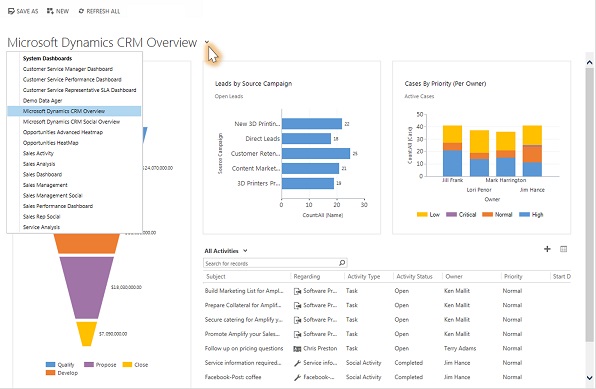
Source: MS Dynamics
Pricing of ERP Software
Pricing is a top decisive factor when selecting reliable ERP software. The pricing of the software is based on various critical parameters. Businesses failing to consider the overall charges in an ERP system often end up utilizing excess funds and resources. Reports indicate that more than 44% of organizations experienced cost overruns issues during ERP implementation. It is always safe to understand the hidden costs before making a purchase. Have a look at the following variation of hidden costs.
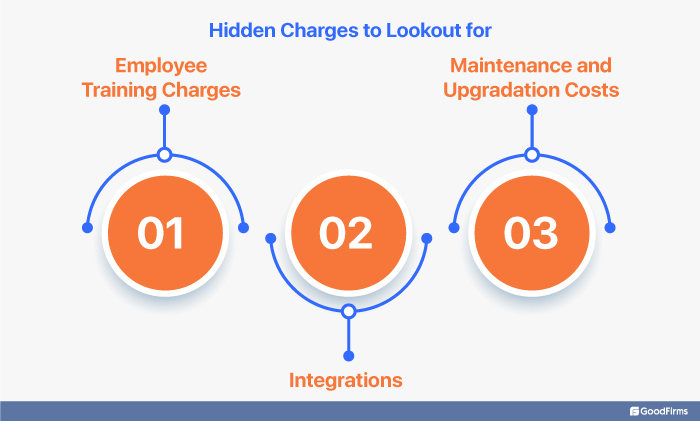
- Employee Training Charges - Although most software vendors provide user guides, few features require proper training for better understanding. It can to additional costs. Around 33% of companies agree that the lack of internal facilities is one of the biggest impediments to ERP implementation.
- Integrations - ERP systems need not necessarily come with all the desired functionalities. Rather, they are made to support integrations with other software and tools for better performance. Some of these integrations are free, whereas many are paid. Businesses should keep such price considerations in mind before purchasing the system. Interestingly, 31% respondents of in a survey stated that they had to purchase other technologies with ERP, which increased their budget.
- Maintenance and Upgradation Costs - Typically, companies spend a significant amount of their allocated budget on maintaining and updating their software systems. This cost tends to increase while upgrading complex systems.
Pricing and Feature Comparison of Top ERP Software
Pricing and features are two major considerations for users when buying the right ERP system. It becomes more essential given the number of ERP software available in the market. So, let’s make a detailed, transparent, and unbiased comparison of top ERP software currently trending owing to their return on investment.
Let’s take a look at the basic pricing structure.

On average, implementing a typical ERP system can cost between $1,50,000 to $7,50,000 for a business.
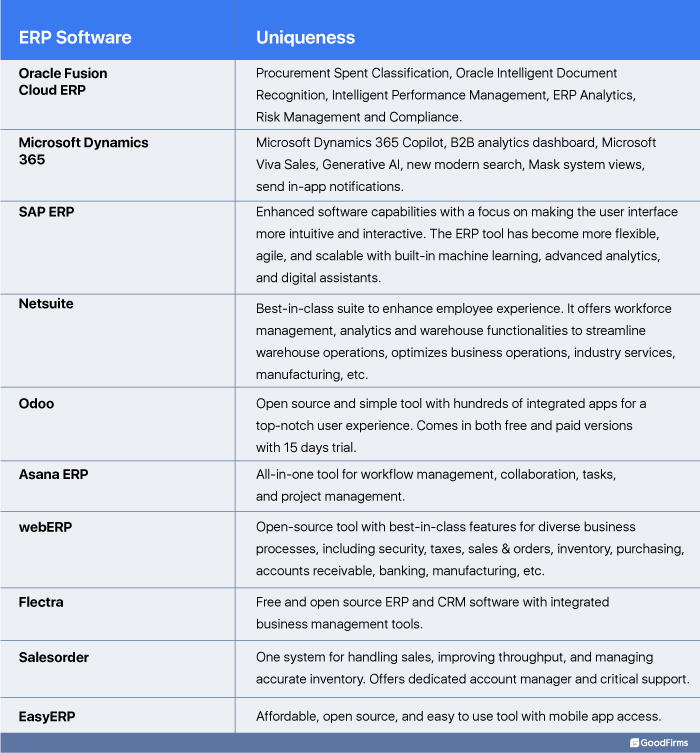
Oracle Fusion Cloud ERP

Source: Oracle Fusion Cloud ERP
Oracle Fusion Cloud ERP is a leader in customer and service-centric enterprise suites that come with built-in artificial intelligence technology. It is one of the top-rated ERP software to predict growth potential, automate manual processes, simplify everyday work, and launch new models faster. It offers the combined and integrational capabilities of financial management, project management, procurement, risk compliance, enterprise performance management, supply chain & manufacturing, etc., besides ERP analytics for better decision-making. For example, the transaction processing costs of Dropbox were reduced by 80% through Fusion Cloud ERP and other Oracle technologies. The software also supports mobile apps for using it in mobiles and tablets.
- Key Clients: Honda, Mazda, HSBC, FedEx, etc.
- Free/Trial: 30-day free trial available with $300 cloud credits.
- Starting Price: The pricing of Oracle Fusion Cloud ERP can cost $625 per month. However, the price increases with integrations and customizations.
- Device compatibility: Android, macOS, Linux/Unix, Windows, and iOS.
Let’s check out a customer review about Oracle ERP.
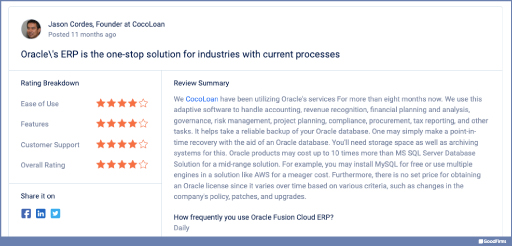
Microsoft Dynamics 365

Source: Microsoft
Dynamics 365 is a Microsoft-owned ERP product for cost reduction and driving more efficiency. The suite saved more than $1.5M in savings for its clients through on-premises and cloud infrastructure. This software comes with customer-centric ERP functionalities supporting accounting integration, customer management, order management, project management, operations management, supply chain management, etc., besides CRM and Business management capabilities. It is a good tool for linking data, people, and processes of an organization with each other.
- Key Clients: Coca-Cola, BMW, HP, Siemens, Maersk, etc.
- Free/Trial: 30 days free trial
- Pricing: The pricing starts from as low as $50 for a single user per month. $20 is charged for additional users. The prices can vary between $20 to $1,500 per user/month based on the services opted for. It can cost nearly or more than 100,000 annually.
- Device compatibility: Android, macOS, Linux/Unix, Windows, and iOS.
Here’s how a customer shared his experience of using Microsoft Dynamics
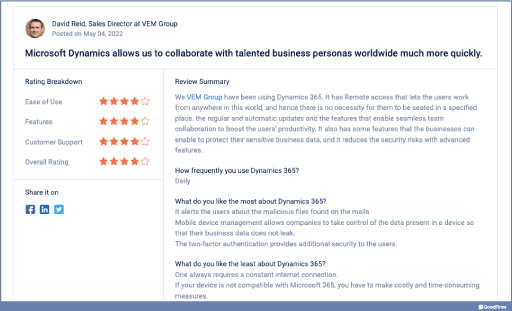
SAP ERP

Source: SAP
SAP ERP has a strong portfolio of managing core business functions, such as finance, manufacturing, HR, supply chain, services, procurement, etc., in one place. It is a flexible, scalable, and low-maintenance software with built-in machine learning, advanced analytics, and digital assistants. SAP S/4HANA cloud private edition is the latest version of SAP ERP, offering advanced capabilities to big businesses. SAP Business ByDesign and SAP Business One ERP solutions are available for small and medium-sized businesses. A Chinese F&B company saw a 50% increase in employee productivity after implementing SAP S/4HANA. This software comes with both on-premises and cloud functionalities at different prices.
“What has changed with SAP S/4HANA Cloud? What hasn’t changed? We’ve matched almost every process with best practices from SAP and gained real-time visibility. The transformation is amazing.” says David de Jong, Senior Project Manager at Topcon.
- Key Clients: NBA, PwC, Topcon, etc.
- Free/Trial: 30 days free trial.
- Pricing: The prices of SAP ERP systems vary with the size of the businesses and can be accurately determined after contacting the vendor. For example, the subscription prices of SAP Business ByDesign start from $20 per user/month.
- Device compatibility: Windows and macOS.
Here’s a customer review of SAP ERP
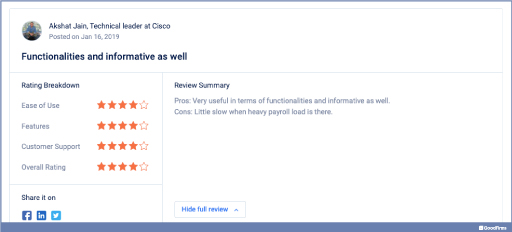
NetSuite ERP
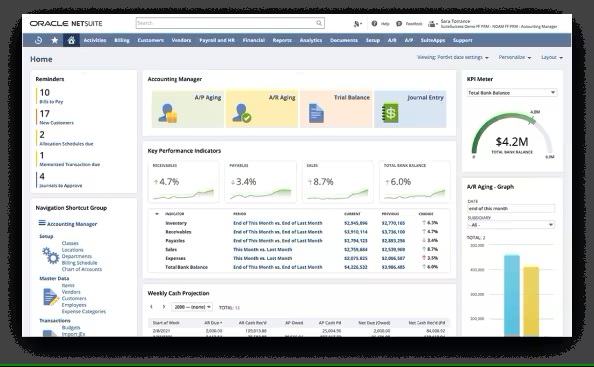
Source: NetSuite
NetSuite is a cloud-based ERP solution from Oracle which is trusted by over 40,000 organizations for real-time visibility; IT cost saving, and manual process reduction. It is among the leading financial and operations management systems that react to new market opportunities with greater control instantly. It provides real-time insights to businesses regarding accounting, distribution, inventory, purchase orders, finance, supply chain, etc., while eliminating upgrade and maintenance costs. An Australian home elevator provider is using NetSuite ERP for automating the inventory management system to instantly generate reports and reduce the staff burden.
- Key Clients: Coca-Cola, Dominos, Genesys, The Superyacht Group, etc.
- Free/Trial: 14 days free trial
- Pricing: The subscription price of Netsuite starts from $99 per month. It increases with optional modules and users.
- Device compatibility: Windows and macOS.
Here’s how a customer shared his experience of using NetSuite ERP
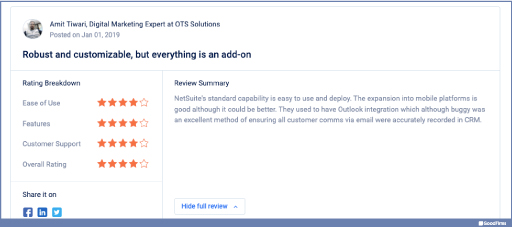
Odoo
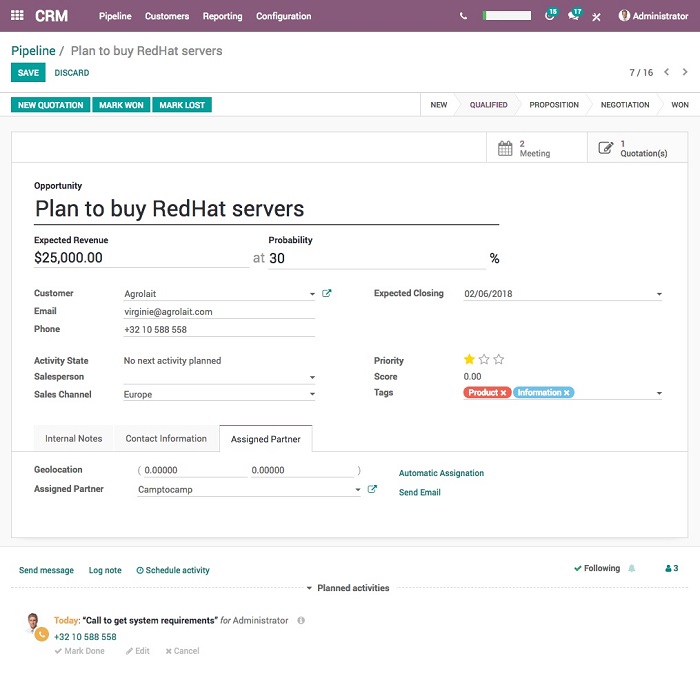
Source: Odoo
Odoo is an open source, scalable, and fully integrated enterprise suite for businesses supporting a wide range of business applications. It is popular among customers for boosting sales, integrating projects and processes, streamlining operations, finance management, marketing, and many functions. The suite offers enhanced automation and tracking abilities for seamless coordination and functioning of the business. A US-based leading online bookseller is saving upto 30% of their time due to the availability of data in a single place. Besides time-saving, it is a reliable tool to increase accuracy, productivity, and traceability.
- Key clients: Sodexo, Toyota, Hyundai, Trident, etc.
- Free/Trial: 15 days free trial besides the free version.
- Pricing: Odoo ERP software offers its subscription in two packages, i.e., standard and custom, whose prices vary from around $7 to $11 per user/month. The suite also offers a free package for single applications usage upto an extent.
- Device compatibility: Android, iOS, macOS, Linux/Unix, and Windows.
Let’s check out a customer review about Odoo
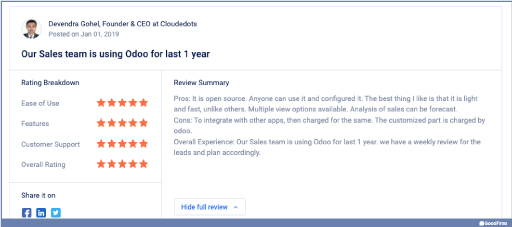
Asana ERP

Source: Asana
Asana is a leading ERP solution that comes with strong marketing, operations, and product management functions. It is used by different business teams and functions for automating processes, driving cross-team efficiency, acquiring real-time insights, setting goals, and centralized onboarding. This software is also preferred by users owing to its features, such as workflow builder, app integrations, reporting, goal setting, workload management, etc. Asana can integrate with tools like Dropbox, Google Drive, Slack, etc., for quick and easy work execution. For example, Asana's ERP solution helped Sony, a leading electronic and appliance manufacturer in, expand its creative production capacity by 4x.
- Key Clients: Spotify, The New York Times, Deloitte, USAID, Nasa, etc.
- Free/Trial: Free version available.
- Pricing: The pricing of Asana ERP starts from as low as $10.99 per user/month. It also offers a free version for individual users and small teams.
- Device compatibility: Android, macOS, Windows, and iOS.
Here’s a customer review of Asana
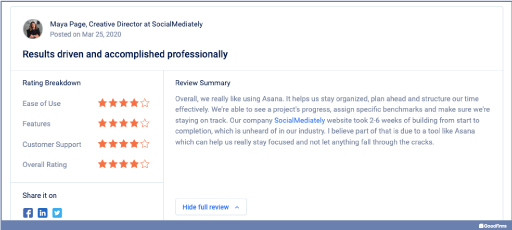
webERP
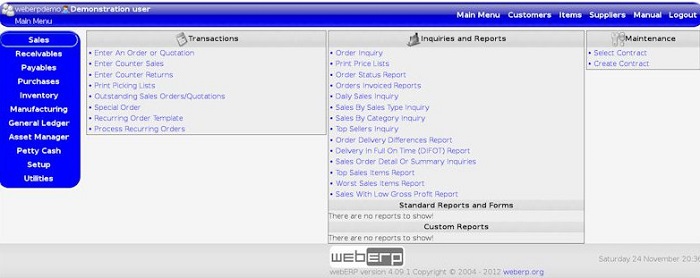
Source: webERP
webERP is a web-based open-source software used by thousands of small and medium businesses. Its strong accounting and business management functionalities are ideal for wholesalers, distributors, and manufacturers. It comes loaded with functionalities such as multi-currency, multi-inventory location, serial and lot tracking inventory, full double entry general ledger, weighted average or standard costing, manufacturing works orders, material requirements planning, shipment costing, and contract/job costing.
- Free/Trial: Free and open-source
- Pricing: webERP is a free-of-cost ERP solution.
- Device compatibility: Windows, macOS, Android, iPhone, and iPad.
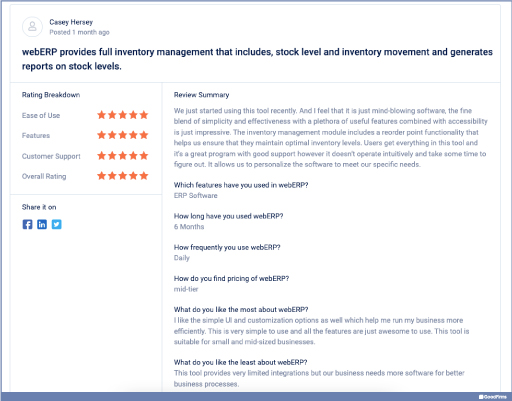
Flectra
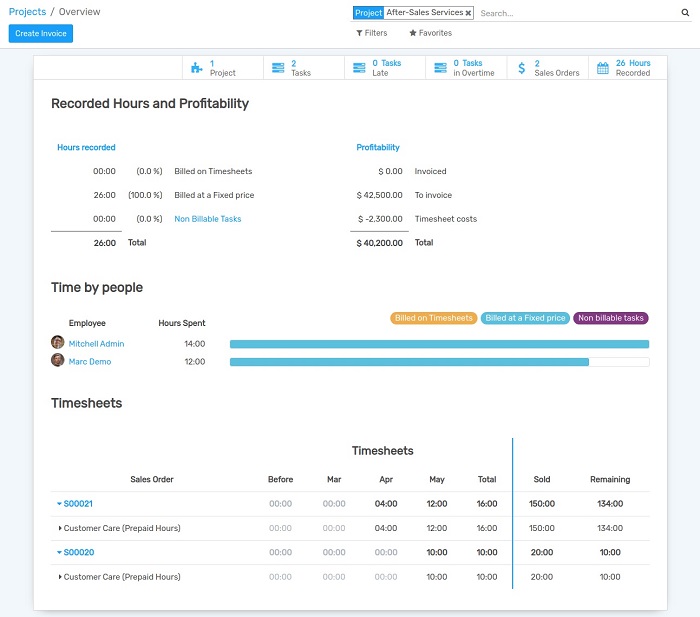
Source: Flectrahq
Flectra is a one-stop ERP solution mainly for restaurants, retail businesses, and other brick-and-mortar businesses. It is used by a huge number of users for better business management and to serve enhanced customer experience. It comes with a powerful module design covering sales, finance, marketing, inventory, human resources, customer service, etc. This ERP software offers strong security and support assistance so that clients can clearly focus on their goals. Flectra is a popular choice for businesses owing to its advanced features for different organizational functions.
- Key Clients: Rotary, helimission, BS2, neuland, etc.
- Free/Trial:15 days free trial.
- Pricing: The price of Flectra ERP starts from $4.99 per user/month. You will be billed annually with a minimum of 5 users required. Flectra also offers a free version with limited functionalities to users.
- Device compatibility: Android, macOS, Linux/Unix, Windows, and iOS.
Check out the review by a customer of Flectra
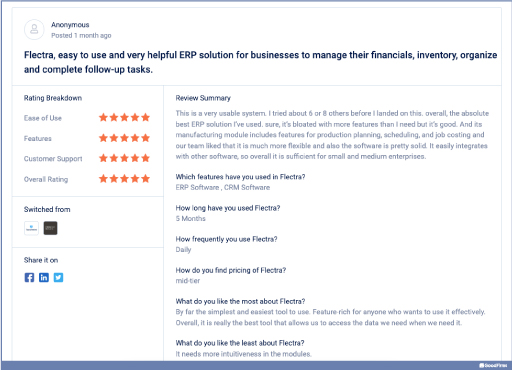
Salesorder

Source: Salesorder
Salesorder is a popular ERP software trusted by hundreds of wholesalers for business optimization purposes. It is one system for handling sales, improving throughput, and managing accurate inventory for delivering best-in-class business intelligence. It offers a single solution for CRM, order and inventory management, multi-warehouse management, multicurrency accounting, business intelligence, reporting, customization, and automation modules for optimum business efficiency. With their tool, the company offers dedicated account managers and critical support, besides free training and on-demand expertise. Upon purchasing the software, users get unlimited user access, transactions, systems, API integrations, etc.
- Free/Trial: No free version/Trial
- Pricing: Users can start for free on Salesorder. However, they need to pay 0.33% of monthly revenue in arrears on a monthly basis for availing of all the benefits.
- Device compatibility: Windows, macOS, Android, iPhone, and iPad.
Here is a review of Salesorder’s customer
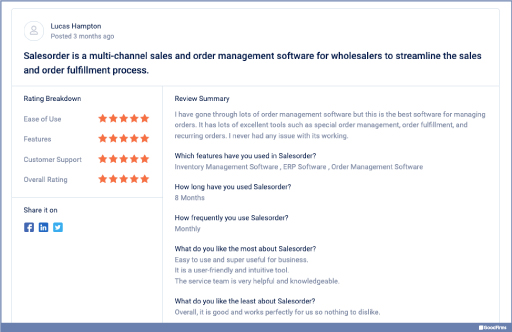
EasyERP
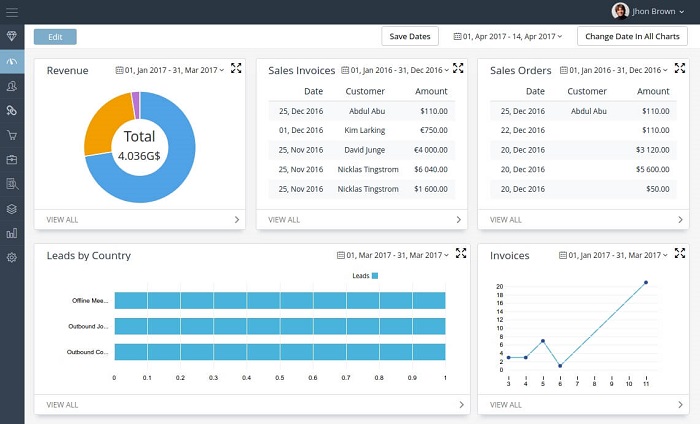
Source: EasyERP
EasyERP is a leading open source ERP system for small and medium businesses to increase their sales and productivity. It lets users create their own sales dashboards, manage leads, get all inventory, improving out of stock and over-stock, manage human resources, etc., from a single place, eliminating the need for separate CRM, inventory management, and accounting tools. It is one of the rapidly growing e-commerce-based IT solutions for fast customizations, support, and easy integration with Magento, Etsy, Shopify, etc. It also comes with a mobile app to remotely access the data.
- Free/Trial: Free version available.
- Pricing: The pricing of the EasyERP starts from $12 per user/month. There are two packages available, i.e., Cloud SAAS ERP and Standalone, besides the open source free beta version.
- Device compatibility: Windows, macOS, Android, iPhone, and iPad.
Check out the review by a customer of EasyERP
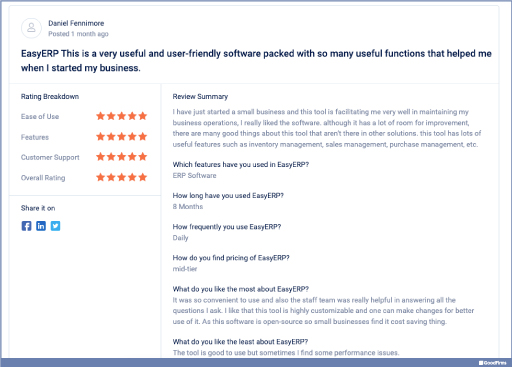
Future of ERP Software
The global ERP market will be worth $71.34 billion in the upcoming years, with a CAGR of 6.2%. This growth will be mainly driven by the changing business needs and new developments in digital technologies. However, some businesses are still reluctant in implementing ERP owing to the challenges associated with legacy systems, data integration, scalability, agility, security, and compliance. In addition, a lack of executive leadership, organizational readiness, user involvement, change management, etc., also contribute to the failed ERP implementation.
“One of the biggest mistakes during ERP projects is not taking the time to build a common understanding of how business is conducted today and potential improvement opportunities.” - Steven Scott Phillips, Author of Control Your ERP Destiny.
However, businesses can mitigate these challenges to a great extent by incorporating innovative and latest technologies into ERP systems. Digital technologies like artificial intelligence, machine learning, cloud-based ERP, deep learning, mobile ERP, IoT, etc., are playing a significant role in transforming business processes. These technologies help businesses in converting humongous amounts of data into actionable insights, which makes the entire process more seamless. Currently, they are facilitating zero-touch automation, interactive assistants, intelligent advisors, etc. AI in ERP is gaining more traction these days. Microsoft’s AI Copilot with ERP is a typical example. More players are also checking on the integrations.
ERP systems are expected to become more advanced and futuristic, which will further improve workflow optimization, lead time shortening, manual error reduction, etc. The latest trends like cloud-based ERP, two-tier ERP, improved extensibility and integration, mobile-powered ERP, predictive analytics, etc., will enable businesses to make faster and more accurate decisions, eliminate red flags and bring new process improvements. ERP systems will contribute significantly to enhancing Environmental, Social & Governance (ESG), and sustainability initiatives to boost efficiency and optimize processes. If you are planning to invest in an ERP software, then Goodfirms can be your one-stop solution to check reviews, ratings, compare, and make a quick decision.








